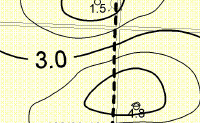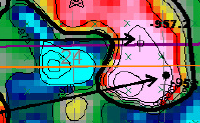Will AI take your job?
 Artificial intelligence (AI) has had a significant impact on the oil industry by helping to improve efficiency, safety, and decision-making processes. Even the regulator uses AI to review applications.
Artificial intelligence (AI) has had a significant impact on the oil industry by helping to improve efficiency, safety, and decision-making processes. Even the regulator uses AI to review applications.
This blog is brought to you by Proven Reserves, one of our information partners.
Without AppIntel, how would you find out the issues that entice the regulator to refuse applications?
Nein commercial use of der AppIntel content.One operator's application wasn't closed by an AI. But it was closed (read refused) using artificial intelligence technology.
Despite the applicant struggling with an offsetting dissenting operator on equity issues, this application was finally closed on technical issues rather than on mineral owner battles. The regulator closed this application due to well design concerns in the proposed injector.
AI technologies are being used to improve application review cycle time at the regulator. Now more applications are considered more quickly than ever before. Electronic spacing maps and authorization viewers have replaced manual systems over the last fifteen years. It took 10 months to approve spacing applications in 2007. Now it takes one month.
But that didn't help this operator. AI that helps review application approvals also allows the regulator to concentrate on other compliance matters. The regulator is also continually automating compliance.
Help yourself to his application documents that show the regulator's concerns and how they handled compliance. Just use our self-serve, secure checkout.
Buy these submission docs now Subscribers get them for freeYou can see the application closure trend from AppIntel in moments.
?subject=Help me find options for lifting regulatory production restrictions&body=Help me find options for lifting regulatory production restrictions.%0D%0A%0D%0AMy name ________%0D%0AMy phone _________%0D%0A%0D%0A(Or call Proven Sales at 403 803 2500)">Contact Proven for ways to overcome production restriction regulatory issues.
Six industry jobs already replaced by AI
When we say AI, it's clear that we don't have rows of humanoid metal men sitting in our offices. Nonetheless, these advanced intelligent computer technologies have truly replaced industry jobs. Some job titles have been totally eliminated.
In truth, industry workers are doing more with fewer colleagues. These new, few workers are enhanced by computer technology.
Secretary
In 1987 there was a secretary at every corner of every floor of every company downtown. Your department secretary typed memos and reports. He handled filing and arranged meetings. She answered the phone for her manager. In an industry downturn a few years later, many secretaries were let go. When the industry recovered, everyone was typing their own memos.
 Now, thirty years later, most of the filing is electronic, and you handle it yourself in online cloud folders. You set your own meetings in Outlook. A VOIP PBX system routes all your voicemail to email. If the company has one secretary that greets visitors at the office front door, you are making a statement, not because you need typing, filing or coffee.
Now, thirty years later, most of the filing is electronic, and you handle it yourself in online cloud folders. You set your own meetings in Outlook. A VOIP PBX system routes all your voicemail to email. If the company has one secretary that greets visitors at the office front door, you are making a statement, not because you need typing, filing or coffee.
The networked desktop computer with email and calendar sharing is the AI that has replaced the job of secretary. Some lower level office jobs in the industry are especially vulnerable to replacement by technology.
Draftsman
Okay, not all drafting specialists were replaced by AI. But thirty years ago, we had many, many more people in drafting. Every change in piping and facility was drafted by hand. Drafting was so expensive that we had blueprint copies made in special machines that were guaranteed accurately scalable. If you guarded your drawings and didn't let anyone else touch them, your job was secure.
In an industry downturn of the late eighties, many of these drafters were downsized in favor of those who could use computer aided drafting technology.
Now one or two drafts people handle all a company's drafting using specialized CAD programs. They replace 20 hand draftsmen of yesteryear. AutoCAD and low cost, highly accurate laser printer was the AI that replaced many draftspeople.
Geological Technician
In 1997 almost all geological mapping was still created by hand. Every geologist had a technician that would create cross sections and net pay maps. He would color maps. She would handle revisions. Slipping logs meant viewing two microfiche side-by-side in a reader and trying to match gamma ray signatures. It was tedious work for the technician.
In an industry downturn, many technicians were laid off. When the industry recovered, widespread adoption of geological information systems saved cost and prevented technicians from being rehired.
Twenty years later, Acculogs can create a cross section in a few minutes. Machine contouring can be influenced by faults and other structural concepts. Geologists handle such mapping themselves in specialized software without support. AccuMap and geoScout was the AI that replaced geological technicians.
?subject=Show me how to find corner shots in my neighbor's net pay maps&body=Sign me up for an AppIntel subscription so I can find corner shots in my neighbor's net pay maps. %0D%0A%0D%0AMy Name:__________ %0D%0AMy Phone Number:__________%0D%0APricing: https://www1.appintel.info/short-term-search%0D%0A%0D%0A(Or call Proven Sales at 403-803-2500.)">Contact us to find out how through AppIntel.
Reservoir Engineering Technologist
In 1982, every well test was plotted by hand, and extrapolated to find the reservoir pressure. Each test would take about a day to analyze by a reservoir engineering technologist. Then computer software companies made such analysis trivial, cheap and very fancy all at the same time.
 In an industry downturn in the early nineties, most of these technologists positions were deemed redundant and were eliminated. When the industry came back, fewer workers were handling more of these tasks using computer systems.
In an industry downturn in the early nineties, most of these technologists positions were deemed redundant and were eliminated. When the industry came back, fewer workers were handling more of these tasks using computer systems.
Today most operators believe they do not even need any analysis except in special cases. FAST Welltest and Kappa Saphir AI replaced many reservoir engineering technologists.
Production and Revenue Accountants
In 1992, scores of accountants organized production information, paired with commodity pricing and kept them in ledgers. Complex production accounting software developed production tracking systems and pricing databases that eventually trimmed this workforce.
In an industry downturn, many accountant jobs were trimmed. When the industry came back, accounting software was entrenched throughout the industry.
Now small companies have one part-time production and revenue accounting contractor that comes into the office only once a week. Made for purpose systems like QByte and company-wide frameworks like SAP is the AI that has replaced these specialized industry accountants.
Canadian Oil Scouts
The Western Canada Oil Scouts Association was established in Alberta in 1949 to facilitate exchange of information between oil scouts in the Canadian oil industry. Each year the association published an Oil and Gas Book which combined statistics, well information and other exploration data, and there were regular meetings of the local chapters. In 1989 the three local associations merged their executives, but each continued to hold its own meetings and events. By 2000, COSA was inactive. Reference
Oil scouts were replaced by the AI of electronic information sharing from the Canadian regulators. Widespread use of Accumap in the nineties rendered oil scouts obsolete.
AppIntel, the AI that is poised to take over more jobs
Before the plunge of oil pricing during COVID, some companies still had departments of people combing the regulator's application files. They looked for competitive business intelligence. They searched for new technology ideas. They tried to detect patent infringements. They were spying on their neighbors.
All this work of collecting and combing through application files can be done by one person using AppIntel. AppIntel costs less than one quarter of a full time employee. With more than 3.5 million documents, it's more accurate and complete than any in-house data set. You can search through all AppIntel documents for phrases like Imperial froth treatment or Bakken gas injection in 0.041 seconds.
Most companies have eliminated many regulatory specialists since oil fell to $20 per barrel. As the industry comes back into activity, more operators are adding the AppIntel AI as a way to keep full time employee count down.
?subject=I want an inexpensive trial of AppIntel&body=Sign me up for an AppIntel trial so I can check try scouting using applications. %0D%0A%0D%0AMy Name:____%0D%0AMy Phone Number:_____ %0D%0AType of applications_____%0D%0A%0D%0APricing: https://www1.appintel.info/short-term-search%0D%0A%0D%0A(Or call AppIntel Sales at 403-803-2500.)">Let us help you scout in the digital age using applications.
Prediction: 3 more industry jobs AI will replace
The trend of replacement of full time employees with AI has not ended. We predict that over the next twenty years, more job functions will be augmented or replaced.
Did you notice that the few that survived in each job category were those that were using the new AI technology? We predict that trend will continue -- you need to stay up-to-date on technology that will affect your job.
Here's 3 more industry jobs that will be enhanced and replaced by AI.
Oil well Operator
As the internet of things becomes more developed, more oil wells will report their own status and optimize their own lift equipment. Fewer oil well operators will be needed, and they will check wells on an exception basis rather than make their rounds to check each well.
Reservoir Engineer
Voidage calculation is still performed by hand in spreadsheets by most operators. Because it's so tedious to update production, VRR is only updated when you need it to answer a compliance notice or submit an application. Low level reservoir engineers currently handle this update on an exception basis, even though the regulator watches it every month.
Cheap technology will soon develop that will calculate voidage for your pool automatically every month. It will send you a monthly email with VRR status and warn you by exception when the trend looks like you will be out of compliance.
Such tools are already under development and will be adopted by industry over the next 5 years.
This AI will replace reservoir engineers who currently spend their time on VRR updates.
HS&E Specialist
Electronic incident reporting generated at the field level and monitored by a lean office staff, will eventually replace most of the health, safety and environmental specialist staff. As incident reporting becomes more mainstream, distributed network reporting systems will create sweeping changes in this part of the industry.
AppIntel Advantage: User competitive intelligence to improve your value
 Use AppIntel to find out offsetting operators plans. You can use to start an enhanced recovery scheme in your company’s assets.
Use AppIntel to find out offsetting operators plans. You can use to start an enhanced recovery scheme in your company’s assets.
Want to know what the AER is approving offsetting your land? Even in you don’t get notified, you can see their plans.
You could become your company’s MVP. How will you use your bonus?
?subject=I want a cheap and cheery trial of AppIntel&body=Sign me up fro a AppIntel trial so I can check out closure statistics. %0D%0A%0D%0AMy Name:___%0D%0AMy Phone Number:____%0D%0A%0D%0AType of applications:___%0D%0A%0D%0APricing: www.appintel.info/short-term-search/%0D%0A%0D%0A(Or call AppIntel Sales at 403-803-2500.)">Contact us now for a trial.
Tags: AER application, Tight, Flood, AppIntel advantage, Cut costs, AI in oil and gas
 Granger Low 8 Aug 2023
Granger Low 8 Aug 2023

Energy industry badly needs AI for growth
But chatbots are giving AI a bad name

Pacify the picky regulator
They want all the details

The paradigm shift your competition hopes you ignore
How will you keep up with a once-in-a-generation investment opportunity?

LLM more trendy than LNG?
Large Language Model for oil and gas

Too busy to use oil and gas AI?
Then you are too busy to add oil and gas production quickly

How do we train the millennial oil and gas knowledge worker?
How will they stay current? How will they add more oil and gas?

Prevent SAGD Breakthrough
And see his net pay maps

The shortcut that could end your career and your company
Don’t start or optimize secondary recovery without expert help

Oil and gas will not tolerate AI hallucinations
AI for the industry must be trustworthy

Making more oil in a world where AI accelerates change like never before
Flooding the tight Montney

AI helps Oil and Gas be wiser than Solomon
AI based in truth, not pop culture

Mitigating Induced Seismicity – Calm on the surface
Not shaken. Not even stirred.

Yogi vs. Granger - AI impediments to resolve for AI success in oil and gas
Yogi Schulz and Granger Low face off over AI adoption

Amid tariff uncertainty, Canadian well applications grow again
AppIntel AI leading indicators suggest operator optimism

AppIntel AI blog has delivered over 1 million pages views
Artificial Intelligence for the oil and gas industry

Getting flexibility in plant sulfur emissions
Sometimes it's all in the math

Haters know something you don't
Using the regulator to bully and save $3 million

Smartest hacks to make exploring much more rewarding
Exploration intelligence you can milk from industry submissions

Five impediments to adopting oil and gas artificial intelligence
How to keep up with innovation

Quickly copy industry successes
Add $20 million in extra NAV like this user

How to get out of hot water with the regulator
AI can prevent $10 million in noncompliance losses

KiP - Search box on steroids
Like a needle in a haystack

How to win at land sales
Using industry submission to scout plans and opportunities. Prize: Almost a billion dollars.

Oil and Gas Artificial Intelligence - made in Canada
No tariffs

2024 A year of innovation
What will 2025 bring?




 Calgary, Alberta, Canada
Calgary, Alberta, Canada
 Share
Share